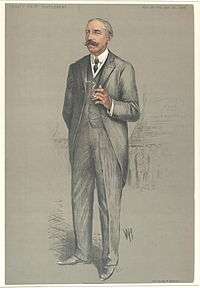George Askwith, 1st Baron Askwith
| The Right Honourable The Lord Askwith KBE, KC | |
|---|---|
|
Caricature entitled "The Conciliator" by Wallace Hester from Vanity Fair, October 25, 1911. | |
| Personal details | |
| Born | 17 February 1861 |
| Died | 2 June 1942 |
| Nationality | British |
| Spouse(s) | Ellen Peel (d. 1962) |
| Alma mater | Brasenose College, Oxford |
George Ranken Askwith, 1st Baron Askwith, KBE, KC (17 February 1861 - 2 June 1942), known as Sir George Askwith between 1911 and 1919, was an English lawyer, civil servant and industrial arbitrator.
Background and education
Askwith was the son of General William Harrison Askwith and Elizabeth Ranken, daughter of George Ranken. He was the great-grandson of William Askwith, Mayor of Ripon. He was educated at Marlborough College and Brasenose College, Oxford, and was called to the Bar, Middle Temple, in 1886.[1] He was appointed a King's Counsel in 1908.[2]
Public life
In 1899 Askwith was one of the counsel in the Venezuelan arbitration case. In 1907 he entered the railways section of the Board of Trade as assistant secretary, and in 1909 was appointed comptroller-general of the Commercial, Labour and Statistical Departments of the Board of Trade. He acted as arbitrator in many industrial disputes,[3] and in 1911 was made a Knight Commander of the Order of the Bath (KCB) in recognition of his valuable work in that capacity,[4] having already been made a CB in 1909.[5] In 1911 he became chairman of the recently constituted Industrial Council, in 1912 he made a special report for the Government on the Canadian labour laws, and in 1913 arbitrated in the Great Black Country Trades strike which lasted for two months and involved in the region of 40,000 workers. In 1915 he was appointed chairman of the Government Arbitration Committee under the Munitions of War Acts, holding this post until 1917. On the Committee of Production he did important work for the Government. In 1919 he retired from his position as chief industrial commissioner,[3] and was raised to the peerage as Baron Askwith, of St Ives in the County of Huntingdon.[6]
Lord Askwith was later was Chairman of the Council of the Royal Society of Arts between 1922 and 1924, Treasurer of the Royal Society of Arts between 1925 and 1927 and its Vice-President between 1927 and 1938. He published Industrial Problems and Disputes (1920), British Taverns, their History and Laws (1928) and Lord James of Hereford (1930).[1]
Personal life
Lord Askwith married Ellen Peel, daughter of Archibald Peel, nephew of the statesman Sir Robert Peel, and the widow of Major Henry Graham (d. 1907), in 1908. They had one daughter.[1] During the First World War, she was a member of the Central Committee on Women's Employment, and was created a Commander of the Order of the British Empire (CBE) in 1918.[3] Lord Askwith died June 1942, aged 81, when the barony became extinct. Lady Askwith died in January 1962.[1]
References
- 1 2 3 4 George Rankin Askwith, 1st and last Baron Askwith (profile), thepeerage.com; accessed 14 April 2016.
- ↑ The London Gazette: no. 28109. p. 1047. 14 February 1908.
- 1 2 3
 One or more of the preceding sentences incorporates text from a publication now in the public domain: Chisholm, Hugh, ed. (1922). "Askwith, George Ranken Askwith, 1st Baron". Encyclopædia Britannica (12th ed.). London & New York.
One or more of the preceding sentences incorporates text from a publication now in the public domain: Chisholm, Hugh, ed. (1922). "Askwith, George Ranken Askwith, 1st Baron". Encyclopædia Britannica (12th ed.). London & New York. - ↑ The London Gazette: no. 28534. p. 7007. 26 September 1911.
- ↑ The London Gazette: no. 28305. p. 8239. 5 November 1909.
- ↑ The London Gazette: no. 31255. p. 4008. 28 March 1919.
External links
- Works by or about George Askwith, 1st Baron Askwith at Internet Archive
- Hansard 1803–2005: contributions in Parliament by Lord Askwith
| Peerage of the United Kingdom | ||
|---|---|---|
| New creation | Baron Askwith 1919–1942 |
Extinct |
